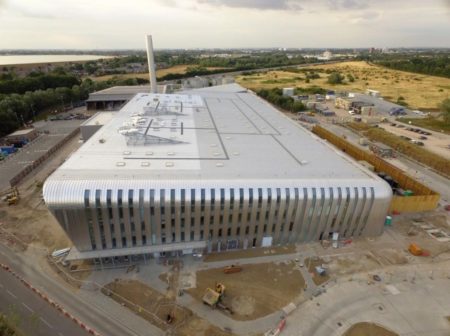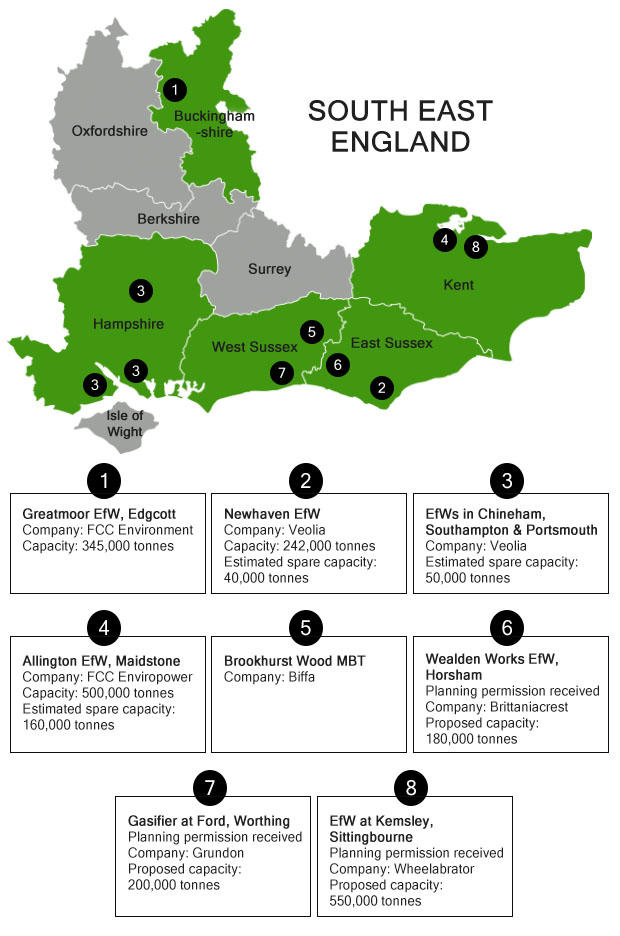EXCLUSIVE: Surrey county council is to examine its options for waste treatment when its contract with Suez recycling and recovery UK expires in 2024.
A strategy is being developed and will consider approaches ranging from a full re-procurement to the breaking up of services into separate packages, which could be procured within a shorter timescale.
And, the county council has produced a report suggesting that in neighbouring counties some energy from waste (EfW) plants may have capacity to take waste from Surrey, which could form the basis of an “inter-authority delegation” (see map and information below).
‘Very different’
Surrey’s cabinet member for environment and planning Mike Goodman told a select committee meeting in June this year that any future arrangement would be “very different” to the existing arrangement with Suez.

The Charlton Lane Eco Park, pictured in July 2018, is currently in hot commissioning and treats a portion of Surrey’s residual waste
Suez was awarded a 25-year waste management contract in 1999. As part of this contract, it is developing an “Eco Park”, a collection of facilities designed to manage waste from Surrey households. This will only take a percentage of the county’s waste once operational, the council says, and so it is investigating using EfW facilities in neighbouring counties to treat the remainder.
A spokesperson for Suez told letsrecycle.com they could not comment on what any changes to the waste strategy might mean to the Eco Park, as that would ultimately fall to Surrey county council.
Surrey
Surrey has had a long and chequered history with EfW plants. The council turned down planning permission for an EfW plant near Guildford in December 2001 (see letsrecycle.com story). The plant, which was designed to handle about 225,000 tonnes of waste a year, was proposed by Thames Waste Management.
The proposal to build 110,000 tonnes-a-year capacity incinerator at Capel was subject to a legal challenge in the High Court in February 2009 (see letsrecycle.com story).
And, commissioning of the Eco Park was scheduled to begin in the spring of 2017 but was late. Food waste was first introduced to the site’s anaerobic digestion (AD) plant in mid-May 2019, while the first waste was fed into the gasifier in September last year (see letsrecycle.com story).
Eco Park
Suez told letsrecycle.com in February the Eco Park was making “steady progress”, with the final stages of testing for its AD facility and hot commissioning of the gasification facility underway (see letsrecycle.com story).
A spokesperson for Suez recycling and recovery UK told letsrecycle.com this month: “In response to the Covid-19 pandemic, in order to prioritise the safety of our staff and subcontractors, commissioning activities on the Eco Park were delayed during lockdown until summer. We used this time to carry out routine maintenance and identify opportunities for further optimisation of both the AD facility and the gasification facility.
“Since lockdown measures were eased, we have made several improvements to both facilities. Commissioning activities on the Eco Park have since resumed and are ongoing.”
EfW capacity
The council’s report on EfW capacity in neighbouring counties is not comprehensive but provides a broad overview of the facilities in the area. The facilities can be seen in the map below.
EfW facilities
The council says Buckinghamshire’s 345,000 tonne capacity Greatmoor EfW plant, operated by FCC Environment, has spare capacity, but all in a future commercial pipeline. In 2018/19 the facility treated 109,000 tonnes of waste from Buckinghamshire and 66,000 tonnes from the North London Waste Authority.
Veolia’s Newhaven Energy Recovery Facility (ERF) in East Sussex has a 242,000-tonne permitted capacity, Surrey says. East Sussex county council and Brighton and Hove borough council deliver around 200,000 tonnes of waste to the facility a year. Surrey estimates this leaves an additional contract waste capacity of around 40,000 tonnes. Contract waste takes priority at the facility, Surrey says, with Veolia sourcing commercial tonnage for its spare capacity. In 2018/19 it took 3,800 tonnes from Medway, 1,300 tonnes from Bristol and 700 tonnes from Croydon.
Hampshire has a PPP contract with Veolia but is at full capacity, Surrey says. Portsmouth and Southampton are Veolia’s co-clients, and Surrey says that if their waste collection authorities collected more food waste it could decrease their residual waste by 15%, equivalent to around 50,000 tonnes a year. This could lead to some additional spare capacity.
Surrey says Kent has a 25-year PPP with FCC Enviropower for the Allington Maidstone EfW until 2030. The Allington EfW has a permitted operational capacity of 500,000 tonnes a year. A planning application consultation was started in October 2019 to extend the current 500,000 tonnes per annum capacity by a further 350,000 tonnes per annum, to a total of 850,000 tonnes a year. Kent has a guaranteed minimum tonnage requirement of 310,000 tonnes a year and is currently disposing of 340,000 tonnes, Surrey says.
Planning
Surrey’s report also noted there are several more facilities currently at the planning stage of development.
Brittaniacrest has received planning permission for an estimated 180,000 tonnes a year EfW facility adjacent to the West Sussex county council mechanical biological treatment (MBT) site at the Wealden Works, Horsham.
Cory Riverside has planning permission for an 800,000 tonne EfW facility at Belvedere alongside its existing 750,000 tonnes a year facility.
Grundon has received planning permission for a gasifier at Ford, Worthing, for up to 200,000 tonnes a year. Grundon has partnered with Viridor on a consultation to extend this to 275,000 tonnes a year.
Wheelabrator has planning permission and a permit for a second 550,000 tonnes-a-year EfW at Kemsley, Sittingbourne.
Since the publication of the report, a further facility has been proposed, located not far from Surrey. Veolia has submitted a planning application for an “advanced energy recovery facility” in Hampshire, which will have the capacity to treat 330,000 tonnes per annum of residual waste (see letsrecycle.com story).
The post Surrey explores EfW options for 2024 appeared first on letsrecycle.com.
Source: letsrecycle.com Waste Managment



